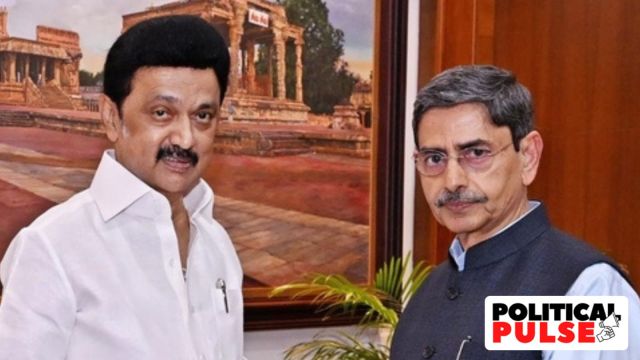The 10 Bills over which TN Governor faces Supreme Court ire
Some of these Bills date back to 2020. Supreme Court rap for Governor Ravi comes at the end of more than a year of bitter constitutional confrontation between him and the DMK government.
 Tamil Nadu governor RN Ravi and Chief Minister MK Stalin during a meeting in Chennai (PTI file photo)
Tamil Nadu governor RN Ravi and Chief Minister MK Stalin during a meeting in Chennai (PTI file photo)In a big win for the DMK government, the Supreme Court Tuesday ruled that Governors cannot delay or withhold assent to Bills indefinitely once they have been passed, or re-passed, by a state Assembly. The verdict, delivered by a Bench of Justices J B Pardiwala and R Mahadevan, comes after more than a year of bitter constitutional confrontation between the DMK-led Tamil Nadu government and Governor R N Ravi, who had withheld assent on 10 key Bills, some dating back to 2020.
The judgment effectively deems the 10 Bills as having received assent, stating that any delay beyond a reasonable time frame is unconstitutional. “The Governor shall not withhold assent once a Bill is passed again by the Assembly,” the Court said, setting specific timelines of one to three months for decisions on legislative matters, depending on the scenario.
These 10 Bills — ranging from amendments to state universities’ governance to measures addressing corruption, public appointments, and early prisoner releases — became the flashpoint in what the Tamil Nadu government described as a “constitutional deadlock.” The verdict, welcomed as a “historic judgment” by Chief Minister M K Stalin, marks a significant assertion of state authority within the federal structure.
Bills on vice-chancellor appointments
The Bills in question include significant amendments to how vice-chancellors are appointed to state universities. The Madras University (Amendment) Bill, Tamil Nadu Agricultural University (Amendment) Bill, and Tamil Nadu Dr Ambedkar Law University (Amendment) Bill, among others, transferred the power of appointing vice-chancellors from the Governor — who traditionally serves as the Chancellor at these institutions — to the state government.
Other Bills, passed between 2022 and 2023, include the Tamil Nadu Dr M G R Medical University (Amendment) Bill, the Tamil University (Amendment) Bill, the Anna University (Amendment) Bill, a second amendment to the Veterinary University Act, and a Bill to create a new Siddha Medical University near Chennai.
Bill passed by previous AIADMK govt
Two Bills, passed in January 2020 under the previous AIADMK government, proposed structural changes in the Tamil Nadu Fisheries University and the Tamil Nadu Veterinary and Animal Sciences University, including giving the government powers of inspection and administrative oversight and renaming the fisheries university after former CM J Jayalalithaa.
Delays in remission orders, TNPSC appointments
The petition, when it was moved in the apex court in 2023, listed not just the 10 pending Bills, but also cited delays in signing remission orders for over 50 prisoners, in approving crucial appointments — including to the Tamil Nadu Public Service Commission (TNPSC) — and in giving consent to prosecute former ministers and MLAs facing corruption charges.
Among the more sensitive issues was the delay in processing remission files for 38 prisoners, including 16 Muslim convicts. The delay triggered political backlash, with the opposition AIADMK accusing the ruling DMK of selective action. The government maintained it had sent the files to the Governor, where they remained unacted upon.
Also pending were proposals to fill TNPSC vacancies. The commission, which is mandated to have a Chairperson and 14 Members, was functioning with just four Members — one of whom was holding the additional charge of the Chairperson. The petition said the Governor raised “dubious queries” to delay the appointment process, despite being provided with necessary clarifications and supporting regulations.
How govt responded
Collectively, these Bills represented a quiet but pointed challenge to the Governor’s traditional control over public universities — one of the few remaining spheres where Governors retain substantial influence despite holding a largely ceremonial position under the Constitution.
While the Assembly passed these Bills after due legislative procedures, they were neither signed nor formally rejected by Governor Ravi. The state government accused the Governor of stalling the legislation and interfering with the democratic process. In October 2023, Tamil Nadu filed a writ petition in the Supreme Court alleging “inaction, omission, delay, and failure” on the part of the Governor, resulting in a breakdown of administrative operations.
According to the petition, the Governor’s refusal to act went beyond delay and amounted to a “malafide exercise of power” to obstruct legislation that sought to reduce his own role in state governance.
The confrontation reached a new pitch in November 2023. Just days after the Supreme Court flagged “serious concern” about Raj Bhavan inaction in multiple states, Governor Ravi returned all 10 Bills to the Assembly. Though the move broke the deadlock, it was criticised as being reactive and constitutionally insufficient.
The Tamil Nadu Assembly convened a Special Session on November 18, 2023, under Rule 26, specifically to re-pass the returned Bills. Speaker M Appavu said the re-passed Bills would now require the Governor’s assent as per constitutional protocol. The session, he had said, would not entertain discussion on the judiciary, the Governor, or the President — its focus would remain strictly on legislative procedure.
Guardrails around Governor powers
The Supreme Court’s Tuesday verdict places tight guardrails around the Governor’s discretion. The Court said that under Article 200 of the Constitution, the Governor must act with a “sense of expedition” and cannot exercise a “pocket veto” by sitting indefinitely on a Bill. Once a Bill is returned, and the Assembly re-passes it without changes, the Governor is duty-bound to grant assent.
Senior Advocate P Wilson, who represented the Tamil Nadu government, called the ruling a “huge win for the DMK government.” “Any subsequent action of the President on a wrongly reserved Bill is void. The Governor has no absolute veto. Article 200 must be read with Article 163 — it binds the Governor to act on the Cabinet’s advice,” he said.
The Court’s ruling also clarifies that if a Governor withholds assent or reserves a Bill contrary to Cabinet advice, he must do so within three months. For re-passed Bills, the timeline is reduced to one month.
CM Stalin, speaking minutes after the verdict at the state Assembly, framed the ruling as a broader ideological win. “This Supreme Court order is not only for Tamil Nadu,” he said in the Assembly. “It is a huge victory for all states in India. The fight based on the principles of Dravidian politics, asserting state autonomy and federalism, will continue — and Tamil Nadu will win it.”
Tamil Nadu’s case is one of several recent legal confrontations between state governments and their Governors. Kerala, Punjab, and Telangana have also approached the Supreme Court, citing similar delays and interference by Governors appointed by the Centre.






- 01
- 02
- 03
- 04
- 05
























